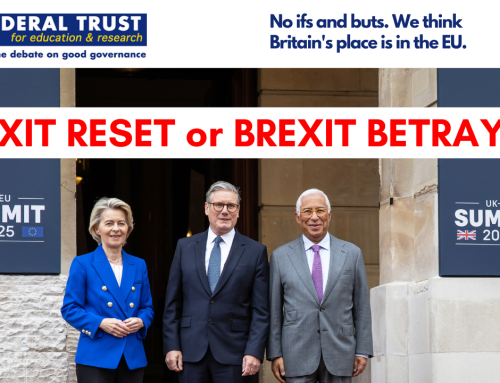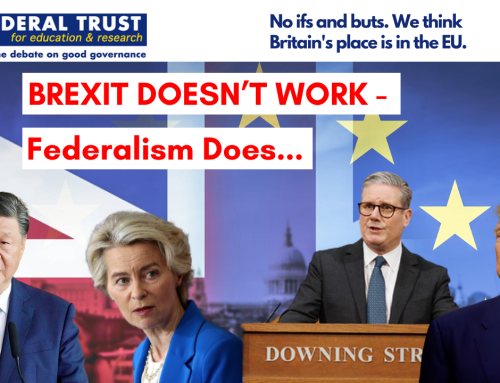The first months of Brexit are a bit like the phoney war of autumn 1939 and winter-spring of 1940. No-one really know what its full impact will be.
One thing is certain. Brexit has not been “done”. We are entering the era of “Brexiternity”. In so many ways Brexit is affecting us and will affect us. Plans have to be made. A whole region or province of the United Kingdom – the six counties of Northern Ireland that was partitioned off from the rest of Ireland after the Irish won their independence in 1921 – now faces a new partition in economic terms, as under the international treaty signed by London and endorsed by Parliament it is EU single market trade and economic rules that are henceforth applied in Northern Ireland.
As Sam McBride of the Belfast Newsletter wrote: “Boris Johnson describes as ‘ludicrous’ the checks which he said would not happen at the Irish sea border which he said would not exist.”
In a normal year 102 million of us take a flight to somewhere in Europe – to do business, attend a meeting or conference, to go on holiday, for a weekend of golf or culture, or hen and stag parties. The figures are hazy but upward of two million Brits have a home somewhere in Europe and either live in one of the 27 countries as permanent residents or live part or most of the year in the warmer south of Europe.
They are facing anxiety, uncertainty and are getting no help from their anti-European government. The 16,000 students from Britain who studied in Europe under the Erasmus programme and the 32,000 European students who became friends of Britain by studying here – including the possible next Chancellor of Germany, Annalena Baerbock, the Green leader, have now been brushed away.
No 10 spins via Bloomberg that instead of Europe, British students can study at Ivy League universities in the US.
Annual student costs at Harvard and Stanford are $70,000 and $75,000 a year. So an Erasmus replacement programme that sends British students to the great US universities would cost a cool $1.2 billion. Go figure if HMT will stump up for that.
Sir Simon Rattle, Europe’s greatest conductor, has had to get German citizenship to continue working as a musician with European orchestras. For thousands of younger, less-famous British musicians and other creative artists and performers, appearing and earning and living at endless music and cultural festivals across the Channel now becomes difficult.
The UK music industry is worth £5.8bn a year and keeps 100,000 creative workers employed with significant earnings from Europe.
They and anyone else who wants to work in Europe from employment as an au-pair to ski-teacher now have new barriers of needing work permits, sponsorship, local qualification.
We Brits are now in the same category as any “Third” country national and laws governing third country nationals are decided at national not EU level.
One or two newspapers like the Financial Times or Guardian have provided good reporting on the problems facing anyone in the UK food business from oyster growers, fishing professionals, cheese farmers to exporters of dairy products or processed meats like sausages.
Sadly the pro-Brexit media – like the Daily Mail or Telegraph or the Murdoch papers – refuse to find any fault with any aspect of Brexit even if thousands of their readers in the real world of business are facing huge problems which normally would merit coverage.
There have been analyses on trade in good and food since January 2021 showing a decline on almost any comparison whether with similar months in earlier years and before the Pandemic or by comparison with comparable countries.
The deal Lord David Frost negotiated was the first one in British history to be premised on lower trade volumes. The EU has always had a trade surplus with the UK in what might be called 19th century economic output – physical goods and food.
The Trade and Cooperation Agreement agreed with fanfare at the end of 2020 confirmed that status quo. Where the UK makes money is in exporting or selling modern capitalism’s money-makers – trade in money, financial services, almost anything the City does, in professional services, in management consultancy advice, legal services, in higher education, architecture, advertising, US-made videos and films to EU TV channels, drawing up contracts and increasingly AI and digital economy goods.
Reliable statistics on trade in this area are notoriously hard to come by, but we do know there has been a steady transfer of jobs and relocation of offices and business from the City with billions worth of share dealing and other financial instruments now being traded from outside the UK.
The hopes of some that the EU would grant rights to the City because London had become a world leader since Margaret Thatcher forced through her EU Single Market policy and abolished national vetoes in many areas of trade in services, have proved illusory. European bankers and financial service CEOs have been unwilling or unable to force their governments to grant such concessions to the City.
As Mairead McGuinness, the European Commissioner for financial services, said in late April: Brussels will “not be recreating access to the single market for the UK as they have chosen to move out”.
As one of Brussel’s top experts on financial rules noted: “For 25 years the Brits have been dictating to Europe and telling Brussels what can and cannot be done. Now the boot is on the other foot.”
The decade of internal UK Brexit warfare is over. But British firms will need advice and guidance from independent sources on the evolution of EU policy as it impacts on business and other decisions, notably green taxonomy decisions in the UK.
The new priority of climate change policies cannot be controlled at national level as life reducing air quality and other bads from excess CO2 pollution do not respect national borders.
The childish refusal of Boris Johnson to treat the EU ambassador in London with the normal courtesies means the UK ambassador to the EU can’t get through the door to find out what the Commission is thinking and planning.
So at the end of Brexit’s first 100 days we are, in truth, no clearer as to what Brexit means. No-one could have spelt out what the future shape of British and European interaction would have been at the end of 1939. We are in a similar position at this stage of Brexit.
The official policy of Labour is to pretend Brexit is not a major challenge for the UK. Its “See No Brexit, Say No Brexit, Hear No Brexit” will have to be re-examined after the 6th May Super Thursday mid-term election.
The future of the UK in the Queen’s 96th year turns on how Scotland reacts to the English nationalists who orchestrated a break in the union and partnership with Europe. What is sauce for the English nationalist union-busting goose is also sauce for the Scottish nationalist union-busting gander.
The first 100 days of Brexit have, in truth, been really rather easy to handle. The Pandemic has shelved for the time being all normal travel, much trade, much intercourse with Europe.
Covid-19 has insulated and isolated Britain from Europe. The paradox of the UK’s excellent vaccine programme now being emulated across the Channel with France vaxing 450,000 a day and Germany 700,000 means that by July or August normal traffic between the EU and the continent should be possible.
How then will people in Britain react as today’s phoney Brexit turns into the real thing?







Leave A Comment